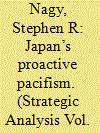| Srl | Item |
| 1 |
ID:
152652


|
|
|
|
|
| Summary/Abstract |
Since 2012, Japan’s foreign policy under Prime Minister (PM) Abe has been characterized as assertive, welcome or provocative. By employing the fear of abandonment/entrapment theory as the analytical framework, this article finds that Japan’s regional foreign policy under Abe is characterized by consolidation and investment in broad-based multilateralism, proactive engagement with partners in the region, including China, and strategic hedging. Findings suggest that the current foreign policy under the rubric of ‘proactive pacifism’ will continue to expand as Japan endeavours to consolidate and invest in multilateralism and rule-based norms through regional trade agreements, and by playing a proactive role in international organizations and regional security operations that abide by Japan’s constitutional limitations.
|
|
|
|
|
|
|
|
|
|
|
|
|
|
|
|
| 2 |
ID:
186359


|
|
|
|
|
| Summary/Abstract |
The 21st century’s central economic nexus will be centred on the Indo-Pacific region. Simultaneously, the intensifying US-China competition in the Indo-Pacific is deepening. Regional middle powers must negotiate this competition to ensure their interests remain intact. This article applies a realist framework to analyse the strategic alignment of Australia, Japan, and India in response to the great power competition. It examines the strategy each middle power is pursuing to protect their interests and the motivations behind their approaches. It finds a convergence in middle power interests centred on maritime behaviour, adherence to international law, and investment in regional institutions.
|
|
|
|
|
|
|
|
|
|
|
|
|
|
|
|